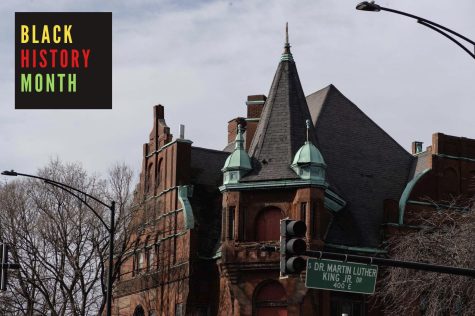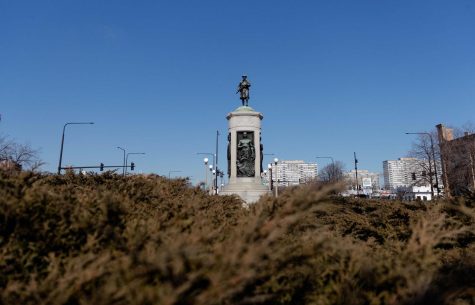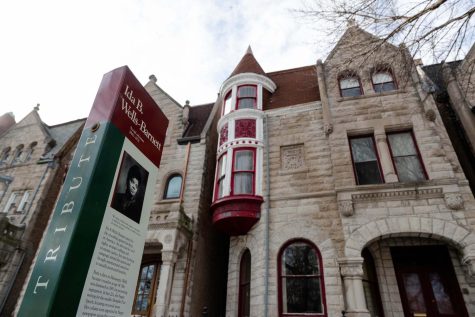‘These buildings tell a story’: Bronzeville Heritage Act advances toward reality
February 1, 2022
Correction Feb. 2: A previous version of this story included a caption that incorrectly identified attorney Ferdinand Lee Barnett, husband of Ida B. Wells, and mislabeled The Forum, which was designated a federal landmark in 2019. We regret the error.
U.S. Rep. Bobby Rush (D-Chicago) has lived in Bronzeville for 20 years and is proud to call it home. In a Jan. 21 email to the Chronicle, Rush said he is touched by its beauty and historic significance every day.
The Bronzeville-Black Metropolis National Heritage Area Act was first introduced in Congress in 2016. After the initial bill failed, it was reintroduced in the U.S. House of Representatives on Feb. 23, 2021 and a Senate hearing was held on Oct. 6, 2021, moving the bill closer to a vote in the House and Senate that could designate the area as a national heritage neighborhood.
“Few places have been as touched by African American culture as the City of Chicago,” said Rush, the Act’s lead sponsor in the U.S. House of Representatives, in his email to the Chronicle. “From Ida B. Wells to Nat King Cole, Bronzeville is a birthplace of Black genius — genius that has had a lasting influence on our city, our state, and indeed our entire nation.”
The proposed bill appropriates $10 million dollars to create the national heritage area.

Rush said more than 200 historical neighborhood assets in Bronzeville will benefit from the financial assistance provided by the bill and by illuminating the neighborhood’s influence on “Chicago’s culture and economy since the Great Migration.”
Lee Bey, author of “Southern Exposure: The Overlooked Architecture of Chicago’s South Side” and a 1988 Columbia journalism alum, said the legislation designating Bronzeville as a national heritage area would reinforce the neighborhood’s importance and change the narrative that described South Side architecture as unimportant.
“These buildings tell a story, not just about architecture but about the people who’ve lived in those buildings,” Bey said.

On Aug. 28, 1997, the Commission on Chicago Landmarks recommended nine city landmarks in the Black Metropolis Bronzeville district, recognizing the historical significance of the neighborhood. This recommendation was approved by the City Council.
Rita Dennin, a 2020 Columbia interdisciplinary documentary alum is the producer of “Bring Back the Forum,” a short film featuring Vic Mensa and Chance the Rapper about the historical building in Bronzeville.
The Forum, 318-328 E. 43rd St., built in 1897 is a performance hall being refurbished by owner and Bronzeville resident Bernard Loyd, president of a restoration company called Urban Juncture, Ltd. The building, which was designated as a federal landmark in 2019, is important for Black people.
The Forum was a space where union meetings and musical performances by famous musicians like Muddy Waters were held. Political speeches were given there too, Dennin said. The building was a cultural hub for the Bronzeville community.
Shermann “Dilla” Thomas, also known as the Chicago Urban Historian, said the Bronzeville Act can unite people nationwide by placing it on a national registry for all Americans.
“We owe so much about what we enjoy in America to Bronzeville,” Thomas said. “Whatever iteration of music you like, it’s going to have a jazz or blues origin to the sound and that by and large comes from Bronzeville specifically.”
Still, Thomas, who lives in the Auburn Gresham neighborhood, noted the gulf between the anti-critical race theory movement and designating Bronzeville as a national heritage area. He said the strength and tenacity of Black people in the face of longstanding oppression is hidden in language.

While perspectives about Bronzeville vary, the value of Bronzeville’s history is not doubted by its supporters, including U.S. Senator Dick Durbin (D-Ill.)
“I’ve continued to introduce the Bronzeville-Black Metropolis National Heritage Area Act with each passing Congress because this neighborhood, with its rich history as a center for culture for the Black community, should be preserved and celebrated for years to come,” said Durbin, the lead sponsor of the Act in the U.S. Senate, in a Jan. 19 email to the Chronicle.
Durbin noted historical places such as the Abbott House, 4742 S. Dr. Martin Luther King Jr. Drive, the home of Robert S. Abbott who established the Chicago Defender in 1905, and the Bronzeville Walk of Fame, also on King Drive.
Though the legislation to create the heritage area still must be approved by the House and Senate before the heritage district becomes a reality, Rush, who announced his retirement from Congress in January, said he plans to make it a priority for his last term.
“Bronzeville unequivocally deserves landmark recognition and I intend to continue fighting to make that a reality,” Rush said in his email to the Chronicle.







